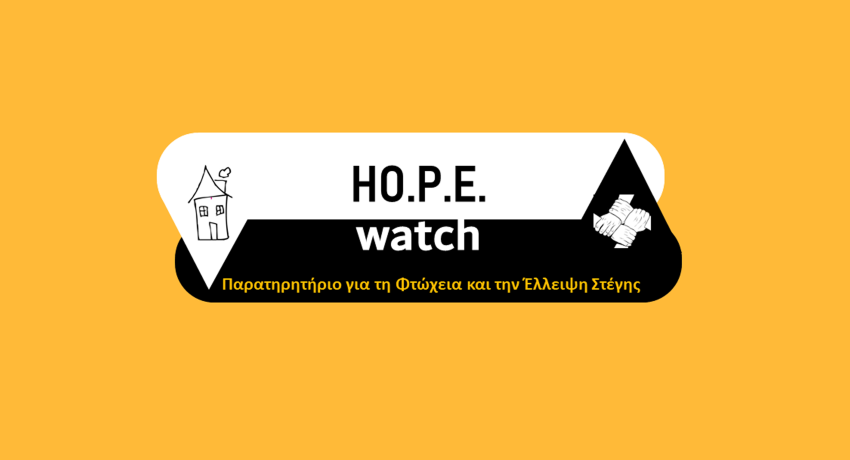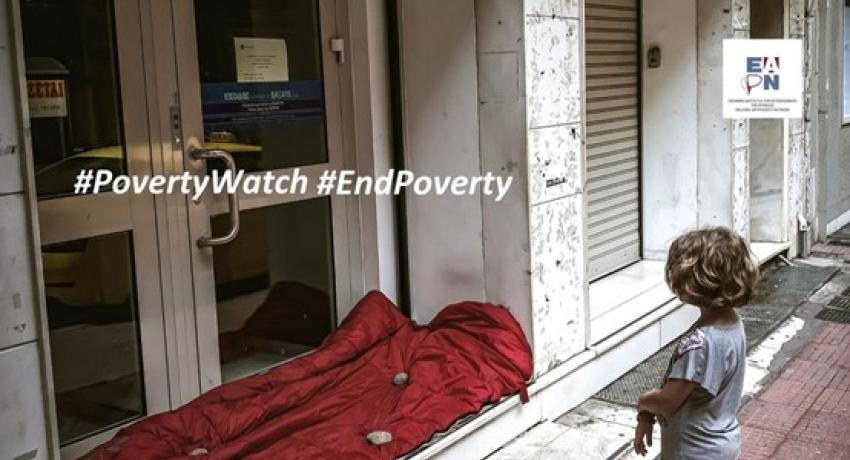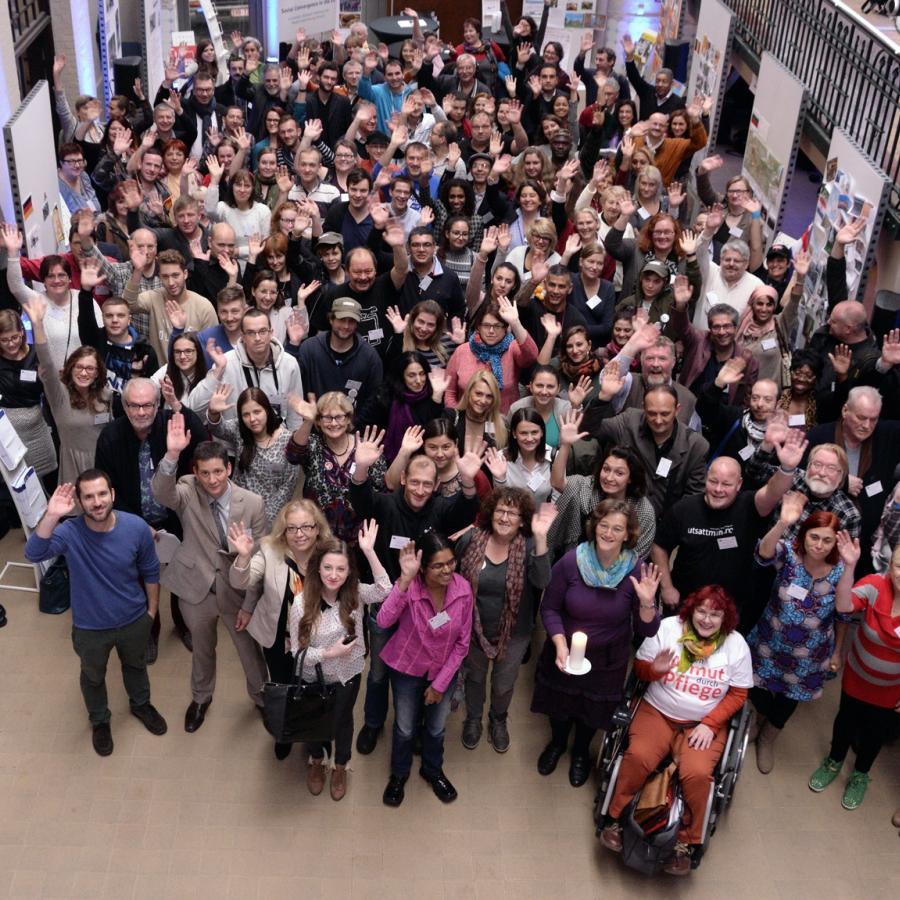Ελληνικό Παρατηρητήριο για τη Φτώχεια και την Έλλειψη Στέγης
Έναρξη υλοποίησης του έργου "Ελληνικό Παρατηρητήριο για τη Φτώχεια και την Έλλειψη Στέγης"
Ενίσχυση της Κοινωνικής Πολιτικής και Προστασία των Ευάλωτων Ομάδων
Το Ελληνικό Δίκτυο για την Καταπολέμηση της Φτώχειας σε συνεργασία με το Ελληνικό Δίκτυο για το Δικαίωμα στη Στέγη και την Κατοικία ανακοινώνουν την έναρξη του έργου “Ελληνικό Παρατηρητήριο για τη Φτώχεια και την Έλλειψη Στέγης”.
Βασικοί στόχοι του Παρατηρητηρίου είναι
● η αρωγή στην προσπάθεια που γίνεται σε επίπεδο Ο.Τ.Α. για την εφαρμογή τοπικής κοινωνικής πολιτικής, μέσω της διάχυσης και δημοσιοποίησης καλών πρακτικών και της προώθησης προτάσεων σχετικά με τη φτώχεια και την έλλειψη στέγης της κοινωνίας των πολιτών, και
● η ενδυνάμωση μέσω εκπαιδευτικών συναντήσεων και εκθέσεων των Οργανώσεων της Κοινωνίας των Πολιτών στις δράσεις συνηγορίας υπέρ των ανθρωπίνων δικαιωμάτων.
Με τον τρόπο αυτό, αναμένεται να υπάρχει μία ενιαία και συντονισμένη καταγραφή των ζητημάτων αυτών σε τοπικό, περιφερειακό και εθνικό επίπεδο, να αναδειχθεί ο ρόλος των Ο.Τ.Α. ως προς την εφαρμογή της κοινωνικής πολιτικής και επακολούθως να ενισχυθεί η προστασία των ευάλωτων κοινωνικών ομάδων στη χώρα.
Η ενδυνάμωση των φορέων προκειμένου να προωθηθεί ο εμπλουτισμός του σχεδιασμού της τοπικής, περιφερειακής και εθνικής κοινωνικής πολιτικής με τις κοινωνικές παραμέτρους που σχετίζονται άμεσα με τις θεμελιώδεις αξίες της Ευρωπαϊκής Ένωσης -όπως αυτές διατυπώνονται στη Συνθήκη της ΕΕ, τον Χάρτη Θεμελιωδών Δικαιωμάτων και τον Ευρωπαϊκό Πυλώνα Κοινωνικών Δικαιωμάτων- γίνεται μέσω των βασικών εργαλείων του Παρατηρητηρίου:
1) τις συστάσεις της Ετήσιας Έκθεσης για τη Φτώχεια στην Ελλάδα
Η Έκθεση για τη Φτώχεια είναι μια συλλογή δεδομένων και αναλύσεων την οποία συντάσσουν ετησίως τα μέλη του Ευρωπαϊκού Δικτύου για την Καταπολέμηση της Φτώχειας (ΕΑΡΝ) και περιλαμβάνει τις τρέχουσες πρακτικές, τις τάσεις και πολιτικές για τη φτώχεια και τον κοινωνικό αποκλεισμό στη χώρα, με συγκεκριμένες συστάσεις για θέματα προτεραιότητας,
2) τα συμπεράσματα της Ευρωπαϊκής Συνάντησης Ανθρώπων που Βιώνουν Φτώχεια
Η Ευρωπαϊκή Συνάντηση των Ανθρώπων που Βιώνουν Φτώχεια διοργανώνεται κάθε χρόνο από το Ευρωπαϊκό Δίκτυο για την Καταπολέμηση της Φτώχειας και συγκεντρώνει, στις Βρυξέλλες για δύο μέρες, ανθρώπους που ζουν σε συνθήκες φτώχειας ή/και κοινωνικού αποκλεισμού, προκειμένου να συζητήσουν και να διατυπώσουν κοινές συστάσεις για την καταπολέμηση των προβλημάτων που είναι σε προτεραιότητα κάθε περίοδο παρουσία εκπροσώπων των θεσμικών οργάνων της Ευρωπαϊκής Ένωσης και ευρωβουλευτών.
3) τις στοχεύσεις της Ευρωπαϊκής Πλατφόρμας για την Καταπολέμηση της Έλλειψης Στέγης
Η Ευρωπαϊκή Πλατφόρμα για την Καταπολέμηση της Έλλειψης Στέγης εγκαινιάστηκε στις 21 Ιουνίου 2021 με την υπογραφή της σχετικής Διακήρυξης της Λισαβόνας όλων των κρατών μελών της ΕΕ. Αποτελεί πρωτοβουλία στο πλαίσιο του Σχεδίου Δράσης του Ευρωπαϊκού Πυλώνα Κοινωνικών Δικαιωμάτων και πέρα από τα κράτη μέλη, συγκεντρώνει ευρωπαϊκά θεσμικά όργανα και οργανώσεις της κοινωνίας των πολιτών με στόχο τη συνεργασία και την αμοιβαία ανταλλαγή βέλτιστων πρακτικών που έχουν στόχο την καταπολέμηση της έλλειψης στέγης στην ΕΕ.
Το Παρατηρητήριο, σεβόμενο το πολύμορφο έργο των Δήμων και αναγνωρίζοντας ότι αυτοί αποτελούν τον πυρήνα όλων των εκφάνσεων της ζωής του πολίτη, ήδη προχώρησε στην αποστολή ερωτηματολογίου προς τους 332 Δήμους της χώρας σε μια προσπάθεια καταγραφής της εφαρμογής των κοινωνικών πολιτικών και των σχετικών προβλημάτων σε τοπικό επίπεδο. Επίσης, μέσω αυτού επιδιώκεται η γνωριμία με τις προτάσεις που προέρχονται από το πεδίο. Ανάλογη διαδικασία θα ακολουθηθεί με τις 13 Περιφέρειες, τα αρμόδια Υπουργεία καθώς και 100 Ο.Κοι.Π., μέλη και μη μέλη των δύο Δικτύων.
Τo Ελληνικό Δίκτυο για την Καταπολέμηση της Φτώχειας και το Ελληνικό Δίκτυο για το Δικαίωμα στη Στέγη και την Κατοικία υπερασπίζονται εδώ και χρόνια τα δικαιώματα των ατόμων που βιώνουν φτώχεια και έλλειψη στέγης. Η συγκροτημένη λειτουργία ενός Παρατηρητηρίου, αποτελούσε εξαρχής βασική τους επιδίωξη.
Για περισσότερες πληροφορίες, επικοινωνήστε με τους Υπεύθυνους Λειτουργίας του Παρατηρητηρίου, Κυριάκο Λαμπριανίδη και Μαρία Δημητριάδη, στο τηλέφωνο 211 40 555 85 ή στο hopewatch.gr@gmail.com.
Παρακολουθήστε τη δράση του Παρατηρητηρίου στη σελίδα https://antipoverty.org.gr/hopewatch

«Το έργο Ελληνικό Παρατηρητήριο για τη Φτώχεια και την Έλλειψη Στέγης στην Ελλάδα (Ε.ΠΑ. Φ.Ε.Σ.) υλοποιείται στο πλαίσιο του προγράμματος BUILD, με φορέα υλοποίησης το Ελληνικό Δίκτυο για την Καταπολέμηση της Φτώχειας και εταίρο το Ελληνικό Δίκτυο για το Δικαίωμα στη Στέγη και την Κατοικία.
Το πρόγραμμα «Building a robust and democratic civic space» (BUILD) έχει ως στόχο την προστασία, την προώθηση και την ευρεία αναγνώριση των θεμελιωδών δικαιωμάτων και αξιών της Ε.Ε., μέσω της στήριξης οργανώσεων της Κοινωνίας των Πολιτών (OKοιΠ) στην Ελλάδα και την Κύπρο και της ενίσχυσης των ικανοτήτων και της βιωσιμότητάς τους. Το BUILD συγχρηματοδοτείται από την Ευρωπαϊκή ‘Ενωση, μέσω του προγράμματος Citizens, Equality, Rights and Values (CERV), το Ίδρυμα Μποδοσάκη και το Κέντρο Στήριξης ΜΚΟ Κύπρου με συνολικό ποσό επιχορήγησης €2,9 εκ. Συντονιστής του BUILD είναι το Ίδρυμα Μποδοσάκη (Ελλάδα) σε σύμπραξη με το Κέντρο Στήριξης ΜΚΟ (Κύπρος)».
Δήλωση αποποίησης ευθύνης
Με τη χρηματοδότηση της Ευρωπαϊκής Ένωσης. Οι απόψεις και οι γνώμες που διατυπώνονται εκφράζουν αποκλειστικά τις απόψεις των συντακτών και δεν αντιπροσωπεύουν κατ’ ανάγκη τις απόψεις της Ευρωπαϊκής Ένωσης, του Ευρωπαϊκού Εκτελεστικού Οργανισμού Εκπαίδευσης και Πολιτισμού (EACEA) ή του Ιδρύματος Μποδοσάκη. Η Ευρωπαϊκή Ένωση και ο EACEA δεν μπορούν να θεωρηθούν υπεύθυνοι για τις εκφραζόμενες απόψεις.



















